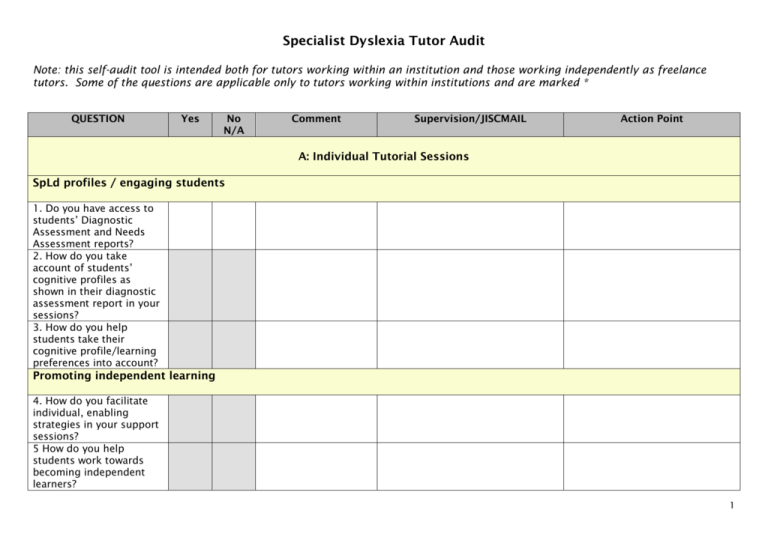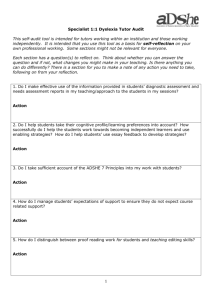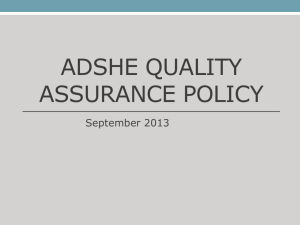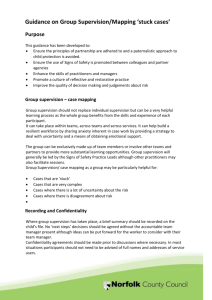TUTOR-AUDIT
advertisement

Specialist Dyslexia Tutor Audit Note: this self-audit tool is intended both for tutors working within an institution and those working independently as freelance tutors. Some of the questions are applicable only to tutors working within institutions and are marked * QUESTION Yes No N/A Comment Supervision/JISCMAIL Action Point A: Individual Tutorial Sessions SpLd profiles / engaging students 1. Do you have access to students’ Diagnostic Assessment and Needs Assessment reports? 2. How do you take account of students’ cognitive profiles as shown in their diagnostic assessment report in your sessions? 3. How do you help students take their cognitive profile/learning preferences into account? Promoting independent learning 4. How do you facilitate individual, enabling strategies in your support sessions? 5 How do you help students work towards becoming independent learners? 1 Incorporating ADSHE 7 principles 6. In what ways do you incorporate the ADSHE 7 Principles1 into your work with students? Establishing a structure 7. How do you structure your sessions? Managing student expectations 8. How do you manage students’ expectations of support to ensure they do not expect course related support? 9. How do you distinguish between proof reading work for students and teaching editing skills? Specific or general difficulties 10. How do you support students who have a lack of experience of academic conventions? 11. How you support students from diverse cultural or educational backgrounds? 12. How do you distinguish between language difficulties and dyslexic difficulties? 1 http://adshe.org.uk/members-only/ 2 Importance of Assistive technology in 1:1 support sessions 13. How do you integrate Assistive Technology into your work? 14. How do you encourage the use of specialist online resources? Recognising non-academic factors in your practice 15. How do you manage non-academic factors in your practice such as social and emotional issues? 16. What guidance do you provide for students who require more support than is appropriate from a dyslexia support session? Reflection on the past year 17. Looking back on the previous year(s) what do you feel has been your most positive learning experience? 18. Which skills set do you feel you would like to develop? Case Study Space2 2 Please annonymise 3 B: Professional Considerations Supervision and CPD 19. How often are you provided with professional supervision? 20. What form does this supervision take? 21. How does supervision help to ensure quality of provision in your support sessions/ help you in your regular activities? Continuing professional development 22. What procedures are in place for you to share practice and information with colleagues externally or internally? 23. What provision have you made for continuing professional development within the last year/three years? 24. Can you identify any training needs? Confidentiality 25*Is there a Confidentiality Agreement in your Service/practice? 26. How do you maintain confidentiality within your sessions? 27. Are there any 4 occasions when you would need to ‘break confidentiality’? If so, why? 28. How do you ensure confidentiality for your student paperwork? Working conditions and Lone working 29. Are you and your students satisfied with your teaching environment/room? How could it be improved? 30. Are specific rooms available for tutorials on a regular basis? 31. Is there a lone working policy within your institution? 32. If you are working in an isolated lone-working environment, what safety measures have you put in place? 33. If tutorials take place within student accommodation how have you assessed the risks this might pose in terms of safety for both you and the student? 34. How do you manage support sessions if you feel uncomfortable with an individual student? 5 Insurance /CRB 35. If you are a freelance tutor, have you arranged sufficient professional indemnity insurance? 36. What is the date of your last CRB check? Record Keeping 37. What learning agreements are in place and how are these organised? 38. *Do you keep case work notes and teaching notes separately according to ADSHE3 guidelines? 39. What methods do you use to ensure timely record-keeping? D: Institutional Considerations Initial screening 40. *Are you involved in screening assessments? 41. *What does the screening process involve? 42. * How much time is allocated for the screening? 3 http://adshe.org.uk/members-only/ 6 43.* What advice/support is provided to the student immediately after the screening process? 44.* How is the information from the screening passed to the student? Assessments 45.*Do you meet with students following diagnostic assessment to explain the implications and set up support? 46. Are you involved in making recommendations for reasonable adjustments e.g. extra time for exams? 47. What type of recommendations have you made recently? 48. * Is the turnaround time from diagnosis to report within the ADSHE recommendation of two week? Sharing information with colleagues 49. What information and/or feedback do you provide about individual students you are supporting to academic tutors or other departments? 50. Is there an opportunity for you to 7 influence institutional/academic marking practices? 51. Do you provide advice to colleagues about inclusive learning and reasonable adjustments? 52. If yes, what form does this advice take? 53. Are you invited to department and team meetings? 54. If yes, what is your role? Student Feedback 55. How do you use feedback students’ receive from their assignments to help them develop strategies/ study skills? 56. What mechanisms do you have for gathering student feedback about your sessions/service? 57. How do you involve students in monitoring the quality of the service you provide? 8







